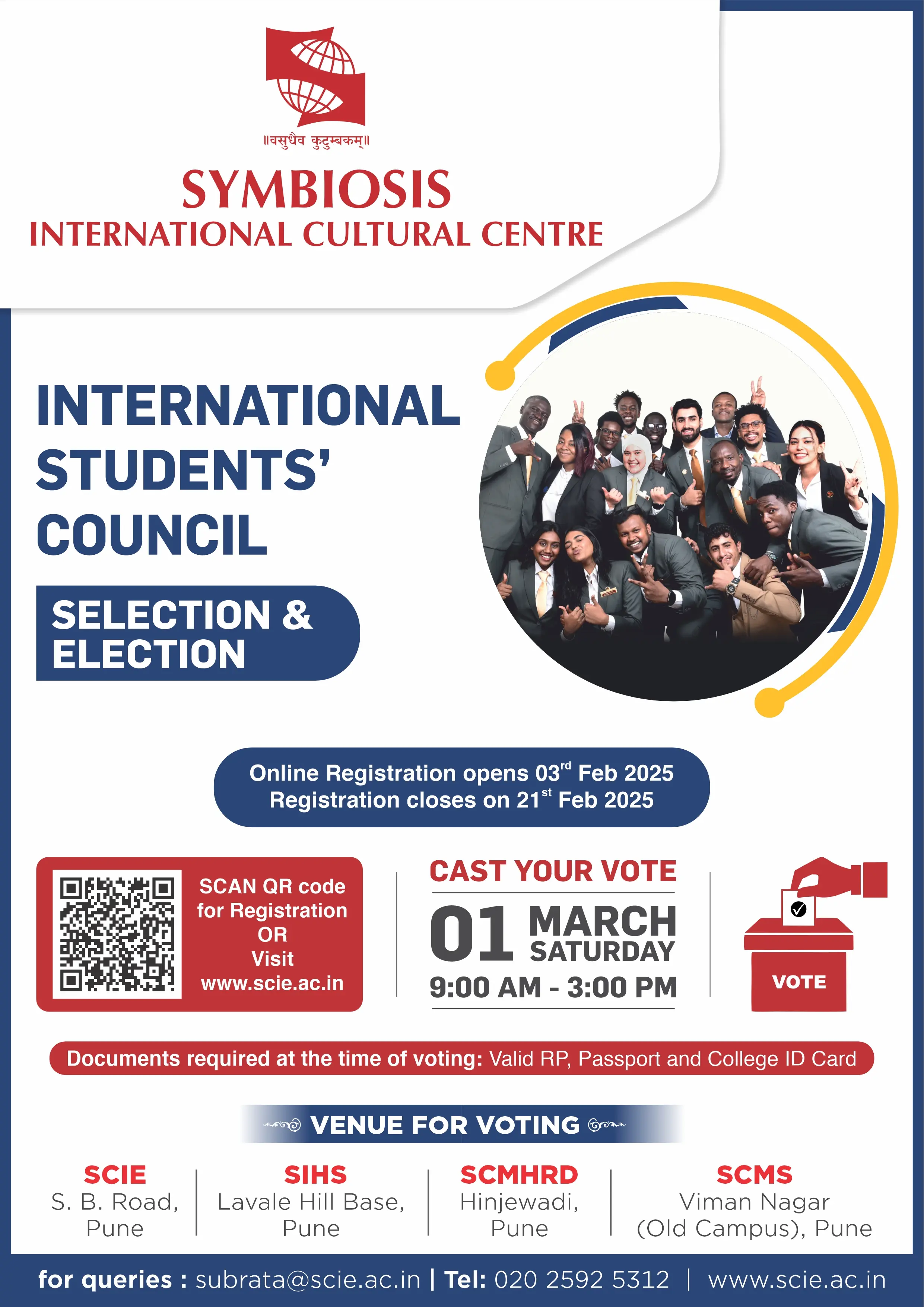 Symbiosis International (Deemed University)
Symbiosis International (Deemed University)
Since its inception in 1971 Symbiosis has been strongly committed to the internationalization of higher education. Having its foundation in the vedic thought of ‘Vasudhaiva Kutumbakkam’ (the world is one family), the vision of the University is ‘to promote international understanding through quality education’. True to its vision the university has kept internationalization as a very strong focus in all its activities and believes that it is much needed in today’s globalized world.
The University’s genesis was rooted in compassion towards international students studying in Pune, Maharashtra, India. Today, SIU continues to attract a large number of international students. Given the long and proud history of Symbiosis as an international university and the influential role of its founder Dr. S.B. Mujumdar on the Indian Higher Education policy scene, it was considered imperative to develop an International Policy that integrates the internationalization efforts across the university and contributes to the advancement of Indian Higher Education globally.
Its internationalization policy provides a clear road map to guide its leadership on how to emphasise the consolidation and broadening of existing partnerships, enhance the University’s growing international reputation for excellence, and ensure that students receive valuably significant ‘international’ experience/exposure. The University believes that a diverse and integrated student cohort, with international students from diverse countries and backgrounds, and across all disciplines, gives all students an international experience; a concept uniquely called ‘Internationalization @ Home’. It is also equally significant that the university’s academic reputation is also determined by the types of students and staff we attract, the quality of our international partners, and the extent to which our alumni are proud to identify with us.
 This Internationalization Policy is based on the following beliefs and commitments:
This Internationalization Policy is based on the following beliefs and commitments:
- SIU believes that the quality of research and knowledge gained by its graduates will be enhanced by hiring faculty having an international background and by inviting international faculty on short and long term engagement to teach, conduct faculty development programs, seminars, workshops, joint research publications and research grants among other academic activities.
- SIU believes that its students should receive an international exposure by encouraging them to participate in Global Immersion Programs such as semester exchange/summer-winter schools and internship programs. SIU Scholarships offered to students after a rigorous selection process, ensure that deserving students get the opportunity to travel abroad for study/research/internship without financial constraints holding them back.
- SIU’s regional focus has traditionally been on West Asia and Africa with a view to capacity building and hence is strongly committed to offering scholarships for deserving African students keen for under graduate and post graduate studies.
- SIU will strive to enrich the quantity and quality of its international partnerships. The university collaborations in the past require review to ensure that they are relevant today and active in contributing to a enriched teaching-learning-research ecosystem. The focus will now be to forge partnerships that offer multiple benefits across more than one Faculty and build targeted relationship based on alignment of academic-community interests and research goals.
- SIU is committed to enhance its research capacity by establishing research centres and clusters. While framing the research strategy, SIU believes that research partnerships and knowledge exchange should have real-world benefits for society, culture, the environment and the economy and will work with its international partners to this end.
 Internationalization Mission:
Internationalization Mission:
The overarching priority of the Symbiosis Centre for International Education (SCIE), the central office for all international efforts, activities and initiatives at SIU, is to further strengthen the university’s global footprint. Given its genesis, the University’s aspirations are international and must therefore be measured in that context. This commitment to internationalization must be reflected in all areas of university life, its organization, culture and governance - from its students and staff, to its collaborations, and in the important academic and societal contributions it makes.
Symbiosis Centre for International Education has three distinct departments to help achieve these objectives:
- International Promotions & International Student Relations.
- International Student Admissions & Student Events.
- Initiatives & Collaborations.
Through these departments, Symbiosis Centre for International Education aims to achieve the following strategic goals:
- 1. International Student Recruitment & Expansion in key markets.
- 1.1 Develop a clear and focused Strategic Enrollment Management plan.
- 1.2 Provide easily accessible web based information for recruitment and selection of international students and staff.
- 1.3 Enhance investment for market research and promotional activities in priority countries.
- 1.4 Have a more balanced orientation in terms of the diversity of international students on campus and provide necessary financial incentives and scholarships to increase student intake from backward countries.
- 1.5 Support the Government of India in its national goal of establishing India as an educational destination for quality higher education.
- 2. Enhance teaching & learning (with an emphasis on research) and enrich student engagement.
- 2.1 Encourage incoming/outgoing student mobility.
- 2.2 Encourage professional development of faculty and staff by engaging them in international research projects and international faculty development programs.
- 2.3 Enhance the access to external funds by applying for various externally funded grants and projects.
- 2.4 Enhance inflow of international expertise and perspectives through investment in engaging visiting professors & fellows.
- 2.5 International student feedback system to improve academic, administrative and infrastructural resources necessary for assuring great international student experience.
- 2.6 Support domestic students by providing international exposure through different initiatives and targeted scholarships; new links with international partners; international work placements/internships, etc.
- 2.7 Develop and strengthen links with key institutions and agencies that promote fund and knowledge transfer.
- 3. Internationalization @ Home.
- 3.1 Continuously revise all program curricula by benchmarking with the best universities abroad.
- 3.2 Create and promote essential infrastructure to support internationalization at home activities.
- 3.3 Organize international conferences, leadership series, events and forums for sparking dialogue on contemporary issues of international prominence.
- 3.4 Strengthen the interactions amongst local and international students.
- 3.5 Ensure a local and global context to all academic programs and courses making all programs truly global.
- 4. Strengthen quality assurance processes for Internationalization.
- 4.1 Embed internationalization through a bottoms up and focused approach in key measures, such as performance appraisal, systems & processes, and leadership training.
- 4.2 Commit to international quality partnerships.
- 4.3 Develop comprehensive regulatory evaluation and reporting framework to ensure that the internationalization strategy is successfully implemented.
- 4.4 Embed equal opportunity in all processes and value diversity and inclusiveness of students and staff.
- 5. Strengthen the SIU Brand Internationally.
- 5.1 Expand the International Alumni Network to help build a strong reputation in key countries and regions.
- 5.2 Play an active role in the leadership of International Organizations/Associations and Higher Education policy making bodies abroad.


